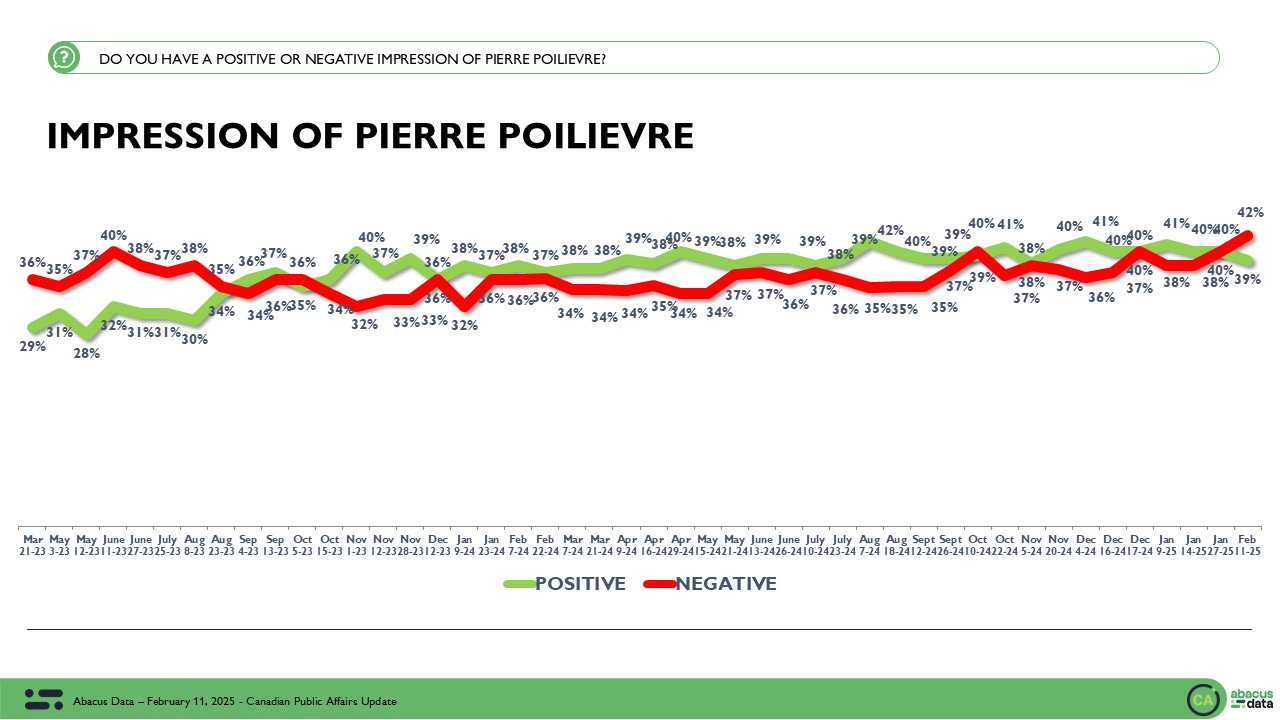Pierre Poilievre's Rubicon
How he handles "Trumpitis" will determine whether he wins big this spring.
Pierre Poilievre and the Conservative Party will hold a big rally in Ottawa today, drawing supporters from across Ontario and beyond for a major rally on Flag Day. Behind the applause, however, lies a more complicated national mood about Poilievre and his chances of broadening the party’s appeal. Recent survey data suggests Canadians remain sharply divided about the Conservative leader—a dynamic the party will need to manage carefully as it adapts to a shifting opinion terrain with Donald Trump looming over it.
How to handle the Trump threat and Trump himself is Poilievre’s rubicon moment.
A Snapshot of Poilievre’s Standing Today
Let’s start with the top-line numbers on Poilievre. Overall, 39% of Canadians have a positive impression of him, 15% remain neutral, 42% hold a negative view, and 4% say they don’t know enough to offer an opinion. The intensity behind these opinions is also noteworthy: almost half of the negative rating falls into the “very negative” category, while about half of his positive support is “very positive.” In other words, Poilievre has a dedicated base but also faces a strong cohort of detractors.
When we look at the trend line, Poilievre’s positives and negatives have wobbled over the past several months—but the overall pattern shows a fairly narrow band. His positive ratings generally hovered in the mid- to upper-30s, with negative ratings close behind. The latest reading suggests a marginal lead for the negative camp (42% vs. 39%), underscoring that he remains a polarizing figure, even as he tries to grow his brand.
The Conservative rally in Ottawa was designed to highlight Poilievre’s economic message—attacking the government’s record on inflation and cost of living—alongside his pledge to “put Canadians first.” It’s a message that resonates strongly with his core supporters. But the data suggests he will need to speak to the issue that is rising rapidly to the top of people’s concerns - Trump.
Comparisons with Past Conservative Leaders
It can be helpful to compare Poilievre’s current standing with those of past Conservative leaders a month or so before an election call. Poilievre is at 39% positive and 42% negative, with only 4% unsure—meaning he is well-known, for better or worse.
By contrast, Erin O’Toole in August 2021 sat at 22% positive, 40% negative, and a whopping 12% “don’t know.” O’Toole was less familiar to Canadians, and though some might see that blank slate as an advantage, he struggled to fill it with enough positive impressions to overcome a widely held sense of uncertainty in the campaign that came a month later.
Andrew Scheer, a month ahead of the 2019 campaign, was at 32% positive and 35% negative, with 9% unsure. Scheer’s numbers were less polarized than Poilievre’s—more Canadians hadn’t formed an opinion yet—but also didn’t show the same degree of enthusiasm on the positive side.
In some respects, Poilievre’s better known than either O’Toole or Scheer were at similar points, and that can be both a blessing and a curse. The upside: fewer Canadians are on the fence about him. The downside: converting his negative or neutral impression into a stronger positive footing is much harder when so many people already have their minds made up.
The ‘Trump Problem’ Looms
One particular challenge for Poilievre—and for the Conservatives more broadly—stems from the outsize political influence of Donald Trump. Among Canadians who say they like Poilievre, 37% also have a positive impression of Trump, but 46% do not. Of that 46%, a full 32% hold a very negative view of the U.S. president. This internal divide is no small matter.







